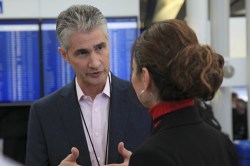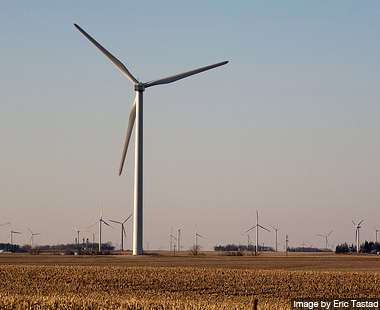
Photo by Martin Lopatka
You may not be able to tell from the sublime stillness of his hair, but United Airlines CEO Jeff Smisek is foaming at his strong-jawed mouth. The European Union at long last has ended United and other airlines’ exemption from the continent’s climate law, including both domestic European flights as well as flights that take off and land in Europe.
That means that United and other U.S. airlines accustomed to polluting with impunity now will have to either improve their efficiency or purchase pollution permits. All in all, that’s expected to add a whopping three dollars to the cost of a transatlantic flight, where coach tickets average $1000 round trip (US airlines are already imposing a surcharge to cover these additional expenses, before they’re even required to pay them!). Each way, the extra expense is equivalent to the price of the 2.6 ounce bag of potato chips that United charges its coach-class customers.

Smisek explaining to a customer why they charge for Pringles.
But that Pringles-size price tag hasn’t stopped Smisek and other airline CEO’s from calling up their favorite senators, John Thune and Claire McCaskill, and their House counterparts and ordering them to throw a climate-killing tantrum. The senators have managed to pass a bill through both Houses of Congress that actually prohibits U.S. airlines from obeying the European climate law. Worse, it puts taxpayers on the hook for bailing out the airlines for the $22 billion in fines they’re expected to accrue as a result of their willful law breaking (full disclosure: I’ve done consulting work with the coalition of environmental groups fighting aviation pollution).
Of course, the airlines could have just improved their efficiency by adding winglets, improving back-up power systems, and retrofitting their engines, or just sucked up the compliance fees as the cost of being a responsible, law-abiding corporate citizen. By the airlines’ calculus, however, it’s much easier to just get some pliant senators like Thune and McCaskill to get taxpayers to bail them out for violating laws they don’t want to obey.
The one potentially important silver lining is that in order to get their bill through the Senate, Thune and McCaskill were forced to accept language calling for climate action in the International Civil Aviation Organization (a sort of UNFCCC for the aviation industry, with all the attendant futility) or a U.S. domestic policy. We’ll have to wait and see on that front, but keep in mind that ICAO’s decades-long failure to act and near-complete control by industry is what spurred Europe to unilateral action in the first place.
As if polluting the skies and our political process wasn’t enough, Smisek also fouled the literary air of the usually anodyne United Hemispheres in-flight magazine with an unhinged rant attacking the idea that flights taking off and landing in Europe should have to obey the laws of Europe. Who wants to read that while stuffed into a coach seat munching on three dollar potato chips?
The irony of the entire legislative tragicomedy is that the airlines aren’t actually worried that the European climate law will be too expensive – they’re worried that it will be too cheap. You see, this is the first time a US industry has been subject to an international carbon cap. If it was expensive and onerous, a whole array of polluters could cite it as a reason not to institute a more comprehensive cap on carbon through the whole economy. But since it will produce significant pollution reductions (equivalent to taking 30 million cars off the road) and costs so little that no one will notice, it will actually be yet another illustration of a longstanding truth: reducing pollution just isn’t that expensive.
Europe’s carbon fee actually pales in comparison to the $16.70 fee imposed by the United States on flights that take off or land here – but in fairness, the airlines’ lobbyists wouldn’t be very good at their jobs if they let hypocrisy stand in the way of trashing the planet.
Indeed, as a recent MIT study shows, US airlines will actually garner “windfall profits” from the European climate law, especially in the early years, because Europe is giving them free pollution permits to ease the pain of having to slightly reduce their planetary destruction.
In other words, melting Arctic, dying polar bears, and flight-disrupting extreme weather notwithstanding, Jeff Smisek and his colleagues oppose the idea of climate action so much that they’re willing to spend tens of millions of dollars to block it…even when climate action will boost their profits.
Perhaps this contempt for their customers and shareholders is the reason why all four of America’s major airlines have gone bankrupt. It’s the same self-defeating approach to sustainability that kept the auto companies funneling money into Washington to block higher fuel efficiency standards when they should have been investing that money in making modern cars that people actually wanted to drive. When companies can ignore the change happening to the planet, it probably means they’re ignoring a lot of other problems as well.


